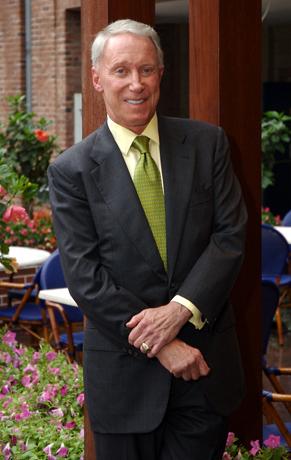Jim Kimsey: D.C.’s Stylish, Generous Achiever
By • March 16, 2016 0 905

Somebody somewhere talked about Jim Kimsey as Washington’s John Wayne. Washington sports king Ted Leonsis, Kimsey’s good friend and partner at AOL, the internet-access company that Kimsey helped found, said on his blog, “He reminded me of a local Clint Eastwood type of hero. He had that kind of charisma.”
Kimsey, who died at the age of 76 of melanoma, had all kinds of charisma, which perhaps accounts for the fact that he could move like a light-footed dancer through boardrooms and bars with equal grace. He seemed to embody the American Dream, in a way reminiscent of F. Scott Fitzgerald’s Jay Gatsby.
Blessed with intelligence, plus the ability to combine style with a certain Irish raffishness, Kimsey achieved much. He had a personable quality that was probably pretty hard to resist. He had the gift of gab, a taste for hard work and a dash of luck to go with it. He made money — lots of it — and he made friends — lots of them. Unlike many, he was as generous with his friendship as he was with the rewards of his success.
Everyone says and knows the same thing: when Kimsey was introduced to a small tech company called Control Video, history shifted. He got together with Steve Case, a young marketer who had made his bones at Pizza Hut, and the two eventually turned Control Video into America Online. Kimsey was founding chairman and chief executive and Case was executive vice president.
The company shot off like a hot train. Kimsey, it’s probably fair to say, provided leadership, connections, vision and optimism, if not digital know-how. Some years later, when the Georgetowner interviewed him in his office, we observed a computer, but Kimsey, with typically offhand humor, said that he’d never really learned to use it properly.
Kimsey’s shares in AOL made him as wealthy as Gatsby. He left in 1995, becoming an icon of charitable giving and power-brokering, a supporter of the arts and culture, especially the Kennedy Center. He lived large and moved about the city and its upper-echelon environs — parties, galas, receptions, the opera and board meetings — with a certain swagger. There was never anything boorish about that. His picture was constantly in the glossies, the society pages, almost always in the company of classy and spectacular women such as Queen Noor of Jordan.
He looked good doing what he did — whether it was Fight Night or the symphony. Not bad for a kid who grew up in Washington in less than wealthy circumstances, got ejected from Gonzaga College High School, got reinstated, went to West Point, served as a U.S. Army Ranger in Vietnam (where he also supported an orphanage) and got involved in the restaurant business in Washington, owning some famous spots, including Bullfeathers and the Exchange.
He is survived by three sons: Mark of McLean, Michael of Prague and Raymond of Washington.
When people who knew him, intimately or in passing, learned of his death, it’s not difficult to imagine that they felt as if a little bit of an original kind of energy had left the room, replaced briefly by memories, whether truckloads or moments.
Jim Kimsey gave wealth and wealthy people, often the target of resentment these days, a good name — and enjoyed his wealth of family and friends for all the best reasons.

